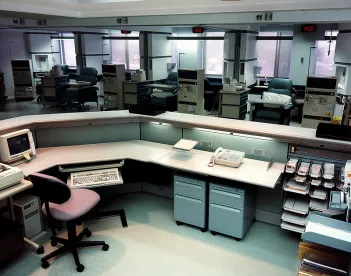A 2008 rule change from the Centers for Medicare and Medicaid (CMS)—which effectively prohibited referring physician-owned companies from furnishing hospital services “under arrangements”—has withstood a challenge by a urology trade association. On June 12, 2015, the U.S. Court of Appeals for the District of Columbia Circuit (D.C. Circuit) held that the 2008 rule change, which redefined an “entity furnishing designated health services” to include entities that perform the services, not just bill for them, constituted a reasonable construction of the Stark Law and was entitled to deference. The appellate court, however, held that CMS’ prohibition on “per-click” equipment rental arrangements lacked a rational basis in light of the agency’s “tortured reading” of a relevant conference report, which, the court noted, was “the stuff of caprice.” Accordingly, the court struck down CMS’ 2008 prohibition on per-click equipment rental arrangements involving referring physician-owned equipment leasing companies.
Important Background and Context
The urology profession’s litigious relationship with the secretary of the U.S. Department of Health and Human Services (Secretary), of which CMS is a part, goes back to at least the early 2000s. At that time, it took the Secretary to court over CMS’ decision to treat lithotripsy—the process of breaking up kidney stones using high-energy sounds waves—as an inpatient or outpatient hospital service when billed by a hospital, and, thus, as one of the Stark Law’s “designated health services” (DHS). Am. Lithotripsy Soc’y v. Thompson, 215 F. Supp. 2d 23 (D.D.C. 2002). Arguing that the legislative history of the Stark Law clearly evidenced congressional intent to exclude lithotripsy from the ambit of the Stark Law, two urologist trade associations prevailed in that litigation. This court decision would later become critical to the continued viability of lithotripsy under-arrangements transactions between urologist-owned lithotripsy companies and hospitals. (Under arrangements is a Medicare term of art referring to hospital subcontracting for facility/technical services to hospital patients, and the under-arrangements supplier is prohibited from billing any person or entity but the hospital for the services.) The urologist-owned lithotripsy companies had, for many years, furnished hospitals with the lithotripter (equipment that shoots high-energy sound waves) and technologist necessary for the performance of lithotripsy typically ordered and performed by the company’s urologist-owners. Although there is some limited coverage and payment for lithotripsy performed by non-hospital facilities, the urologist-owned lithotripsy companies depend on under-arrangements transactions with hospitals for their financial success.
Accordingly, in 2008, when CMS issued an amendment to the regulatory definition of an “entity furnishing DHS” (commonly known as a DHS entity), which effectively prohibited DHS under-arrangements transactions between hospitals and referring physician-owned companies. CMS acknowledged that, because lithotripsy is not a Stark DHS even when it is a hospital service billed by a hospital, its prohibition on DHS under-arrangements transactions between hospitals and referring physician-owned companies did not extend to lithotripsy. 73 Fed. Reg. 48,434, 48,730 (Aug. 19, 2008) (CMS stating: “We presently do not consider lithotripsy to be a DHS, regardless of whether it is performed by a physician-owned service provider and billed by that provider, or whether it is sold by such a provider to a hospital that bills for it.”)
Lithotripsy, however, was not the only hospital services under-arrangements transaction of financial interest to urologists. Urologists also desired to invest in various kinds of laser surgery technology used in the performance of urological procedures in hospitals. They would form companies that would supply the laser surgery equipment and technician to the hospitals where they would perform these procedures. These urologist-owned laser surgery ventures were stymied by CMS’ prohibition on under-arrangements transactions (except lithotripsy), as well as CMS’ prohibition, also in 2008, on per-unit-of-service or per-click equipment rental arrangements with referring physicians (collectively, the 2008 Rule). This particular prohibition on per-click equipment rental arrangements—effectuated by amendments to the regulatory equipment lease, fair market value, and indirect compensation exceptions to the Stark Law—prevented these urologist-owned companies from even leasing the laser surgery equipment to hospitals on an as-needed basis (i.e., at a per-click rental fee, an alternative to their desired under-arrangements transactions with hospitals). Consequently, the Council for Urological Interests (Council)—a group of joint ventures principally owned by urologists—sued the Secretary in 2009, alleging that the 2008 Rule exceeded the Secretary’s authority under the Administrative Procedure Act.
Note that laser surgery under-arrangements transactions were not the only DHS under-arrangements transactions to be disrupted by the 2008 Rule. For example, surgeon-owned companies could no longer provide the facility component of ambulatory surgery services under arrangements to hospitals—a trend prompted by the higher Medicare reimbursement for ambulatory surgeries billed by hospitals as compared to ambulatory surgery centers. The Council’s litigation, therefore, had important implications for DHS under-arrangements transactions beyond the Council’s own interests in laser surgery transactions.
After some wrangling regarding subject matter jurisdiction was resolved (see Council for Urological Interests v. Sebelius, 668 F.3d 704, 714 (D.C. Cir. 2011)), cross-motions for summary judgment were filed. The United States District Court for the District of Columbia granted the government’s motion, concluding that the 2008 Rule was entitled to deference and that the Secretary’s construction of the Stark Law was reasonable. Council for Urological Interests v. Sebelius, 946 F. Supp. 2d 91, 112 (D.D.C. 2013). The Council then appealed to the D.C. Circuit. Council for Urological Interests v. Burwell, No. 13-5235, 2015 U.S. App. LEXIS 9867 (D.C. Cir. June 12, 2015).
The D.C. Circuit’s Decision
Definition of “Entity Furnishing DHS”
The D.C. Circuit concluded that the Secretary reasonably interpreted the Stark statute in promulgating the regulation defining an entity furnishing DHS as including an entity that performs DHS even if it does not bill for the DHS. Specifically, the court noted that the terms provide and furnish are used interchangeably in the statute. Further, this regulatory definition serves the important purpose of “closing a loophole otherwise available to physician-owned entities that would allow circumvention of the purpose of the Stark Law merely by having the hospital bill Medicare for the services,” and it was reasonable for the Secretary to determine that defining the term furnishes as only the entity billing Medicare would “allow abusive practices to evade regulation.” Finally, the court found that the addition of the term performs did not render the definition impermissibly vague, the Secretary having given examples of what constitutes performance.
Ban on Per-Click Equipment Rental Payments
The D.C. Circuit reviewed the 2008 Rule under the two-step test from Chevron U.S.A. v. Natural Resources Defense Council, 467 U.S. 837 (1984) (Chevron). Under step one of Chevron, the D.C. Circuit concluded that the Stark statute did not “unambiguously forbid the Secretary from banning per-click leases.” Specifically, the equipment rental exception in the statute does not expressly permit per-click leases, and the final clause of the exception allows the Secretary to impose by regulation “such other requirements . . . as needed to protect against program or patient abuse.” The fact that the exception did not originally prohibit per-click leases does not mean the Secretary is restricted from later adding such a requirement when expressly authorized by Congress to add requirements needed to protect against program and patient abuse.
Moreover, Congress knew how to expressly permit per-click payments, having done so in one exception (42 U.S.C. § 1395nn(e)(7)(A)(v)), and so the fact that the equipment lease exception is silent on per-click fees cannot be interpreted as congressional intent to permit them. Further, Congress knew how to restrict the Secretary’s authority to impose “other requirements” relating, as per-click fees do, to the prohibition on compensation that takes into account the volume or value of referrals, by creating—as it did in the employment exception context—an exception to the volume/value prohibition for personal productivity compensation (42 U.S.C. § 1395nn(e)(2)). Accordingly, had Congress intended to permit per-click rental charges in the equipment lease exception, it knew how to do so and how to prevent the Secretary from imposing future restrictions inconsistent with such intent. Finally, non-obligatory language in a 1993 U.S. House of Representatives conference report stating that charges under the equipment rental exception may be based on units of service furnished does not unambiguously forbid the Secretary from banning per-click leases; the statute expressly authorizes the Secretary to impose other requirements needed to protect again program and patient abuse.
Under step two of Chevron, however, the D.C. Circuit struck down the Secretary’s prohibition on per-click equipment rental charges, finding that the interpretation was not a permissible and reasonable view of Congress’s intent. The conference report states that “[t]he conferees intend that charges for space and equipment leases may be based on . . . time-based rates or rates based on units of service furnished, so long as the amount of time-based or units of service rates does not fluctuate during the contract period.” H.R. Rep. No. 103-213, at 814 (1993). The Secretary interpreted the conference report to mean that if the total amount of rent over the term of the lease is directly affected by the number of patients referred, those rental charges can arguably be said to fluctuate during the contract period. The court points out that the conference report actually “makes clear that the ‘units of service rates’ are what cannot ‘fluctuate during the contract period,’ not the lessor’s total rental income. . . .” and the Secretary’s interpretation “reads the word ‘rates’ out of the conference report entirely.” The D.C. Circuit lambasted the Secretary for its “bewildering statutory exegesis” that belongs to the “cross-your-fingers-and-hope-it-goes-away school.” Based on this critique of the Secretary’s reasoning, the D.C. Circuit struck down the Secretary’s prohibition on per-click equipment rental charges.
Practical Implications of the Decision for the Health Care Industry
It is possible that CMS, already over-burdened and over-extended, may not re-issue its regulatory restriction on per-click equipment rental arrangements with a new rationale that attempts to better address the conference report. CMS accomplished its more far-reaching objective of prohibiting DHS under-arrangements transactions, and the U.S. Department of Health and Human Services Office of Inspector General (OIG), through published guidance and enforcement actions, continues to be in a position to “regulate” the use of per-click equipment rentals between referring physician-owned leasing companies and DHS entities under the federal anti-kickback statute. OIG has not taken the position that such per-click equipment rentals automatically create liability under the anti-kickback statute, but the risk of such potential liability under the federal anti-kickback statute (as well as state anti-kickback statutes) could have a chilling effect on them.





 />i
/>i

